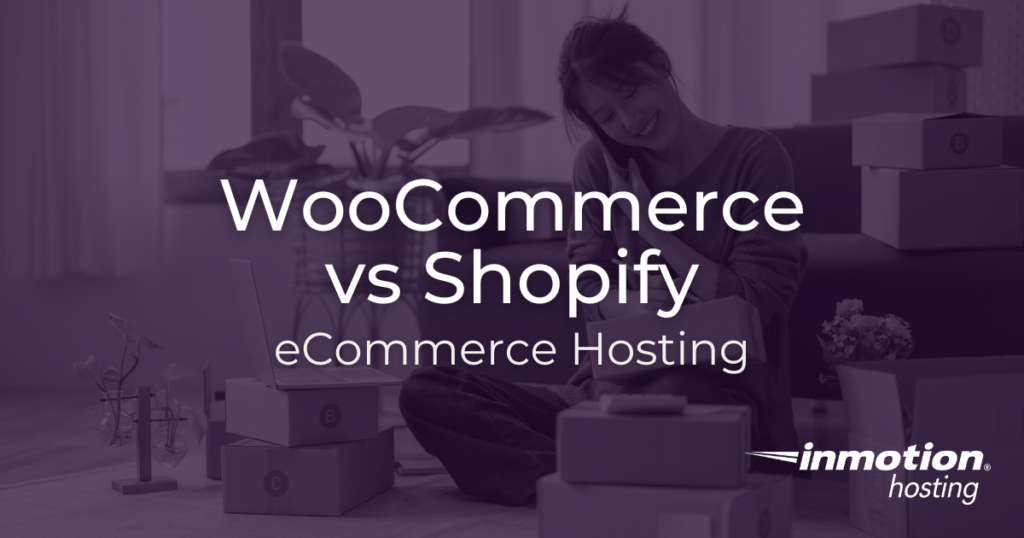
Choosing the right eCommerce platform is crucial when planning your online store. The most popular options worldwide are WooCommerce and Shopify. Both of these platforms offer a range of features and benefits, making them attractive options for those looking to start selling products online.
In this article, we will delve into the world of WooCommerce and Shopify, comparing their features, pricing, ease of use, and more. By the end, you’ll be equipped with the information needed to make an informed decision about which eCommerce platform is right for you.
- WooCommerce vs. Shopify Quick Comparison
- What is WooCommerce?
- What is Shopify?
- Features and Functionalities
- Final Thoughts
WooCommerce vs. Shopify Quick Comparison
At InMotion Hosting, we provide our customers with access to multiple eCommerce hosting solutions; therefore, we want to give you the information you need to choose the right fit for your company.
Note: Please be advised that the information presented below pertains exclusively to the programs themselves, distinct from our hosting plans, and originates from their respective parent companies.
| Features | WooCommerce | Shopify |
|---|---|---|
| eCommerce Market Share % | 38% | 10% |
| Hosting Level Required | Shared + | N/A |
| Price | Free Plugin | Starts at $29/mo |
| Software Location | WordPress Installation | Shopify Store |
| Themes / Extensions | Available | Available |
| Drag-and-Drop Builder | Yes | Yes |
| Licensing | Open Source | Proprietary |
| Parent Company | Automattic | Shopify |
Open Source vs. Proprietary Software
Open source software is licensed to allow users to freely view, modify, and distribute the source code, promoting transparency and collaboration among a global community of developers. It is generally free to use and highly customizable, with examples like Linux and Mozilla Firefox.
In contrast, proprietary software is distributed under restrictive licenses that prevent users from accessing or altering the source code, with development typically controlled by the owning company. This type of software usually requires a purchase or subscription, offering limited customization options, as seen in products like Microsoft Windows and Adobe Photoshop.
What is WooCommerce?
WooCommerce is a plugin for WordPress websites. It seamlessly integrates with WordPress, allowing users to transform their sites into powerful online stores.
With WooCommerce, you can sell physical or digital products, manage inventory, process payments, and handle shipping all within a single platform.

One of the factors that make WooCommerce stand out is its flexibility and customization options. It offers a wide range of themes and extensions, allowing users to tailor their online stores to their specific needs.
Improve the performance and security of your WooCommerce site with our new WooCommerce Hosting plans. Get 40x faster speeds for your online store with dedicated resources, server caching, and optimization tools.
High-Performance VPS
99.99% Uptime
Free SSL & Dedicated IP
Advanced Server Caching
What is Shopify?
Shopify is a popular e-commerce platform that allows individuals and businesses to create and manage their online stores. Founded in 2006, Shopify has grown to become one of the leading platforms in the e-commerce industry, powering over one million businesses worldwide.
The platform provides customizable templates, intuitive navigation, and drag-and-drop functionality, making it accessible for users of all technical levels.
Shopify also created the Shop app to help businesses showcase their products across a network of Shopify stores. This app provides users with easy access to a wide variety of goods without needing to download separate apps.

One significant drawback of Shopify lies in its proprietary nature, which implies that the infrastructure and codebase are owned and controlled by Shopify itself. Consequently, any content, product data, and customizations you develop within the Shopify ecosystem are inherently tied to the platform.
Essentially, once you’ve committed to Shopify, transitioning to another hosting provider or eCommerce platform becomes challenging and often involves significant effort and potential data loss.
This lack of portability may present limitations for businesses aiming for long-term scalability or seeking to adapt to changing market conditions or technological advancements.
Features and Functionalities: WooCommerce vs Shopify
WooCommerce and Shopify are among the most popular eCommerce solutions worldwide, offering a wide variety of features and functionalities to their users.
Both platforms cater to a diverse range of businesses, ensuring that whether you need deep customization or a hassle-free solution, there’s a robust eCommerce tool available to meet your needs.
WooCommerce provides a high level of customization and control, suitable for those who have web development skills or prefer a more hands-on approach. With a wide variety of free and paid themes and extensions available, WooCommerce offers flexibility in terms of design and functionality.
On the other hand, Shopify offers a simplified approach to setting up an online store. It is a hosted platform, which means users don’t manage servers or software updates. Shopify provides an intuitive interface, making it easy for beginners to navigate and manage their store.
In terms of pricing, WooCommerce is an open source platform, which means it is free to use. However, users may have to pay for additional extensions. Shopify, on the other hand, offers various pricing plans that include hosting and integrated payment solutions.
Ease of Use
WooCommerce and Shopify differ in their approach to ease of use.
WooCommerce, being a plugin, offers a learning curve for users new to WordPress or website development. However, for those already familiar with WordPress, WooCommerce provides a familiar interface and integrates seamlessly into their existing website infrastructure.
It offers extensive customization options, but this flexibility can sometimes lead to complexity, especially for users with limited technical expertise.
In contrast, Shopify is renowned for its beginner-friendly interface and streamlined setup process. Handling hosting, security, and updates, Shopify eases some of the technical barriers for users.
Payment Gateways
Both WooCommerce and Shopify support a wide variety of payment gateways. Some of the top options for business owners to chose from are:
- Affirm
- Amazon Pay
- Klarna
- PayPal Payments
- Square
- Stripe
- And more!
To ensure coverage of your preferred payment gateway review the WooCommerce Extension Marketplace and Shopify’s Payment Gateways section.
Final Thoughts: WooCommerce vs Shopify
While both, WooCommerce and Shopify, have their own set of advantages and disadvantages, the choice often boils down to your personal preferences and business needs.
WooCommerce is a powerful e-commerce platform that allows users to transform their WordPress websites into feature-rich online stores. Its flexibility and customization options make it a popular choice among businesses of all sizes.
Those who prefer complete control over their online stores and possess some technical knowledge favor WooCommerce, while Shopify attracts users who prefer a more user-friendly and managed approach.
